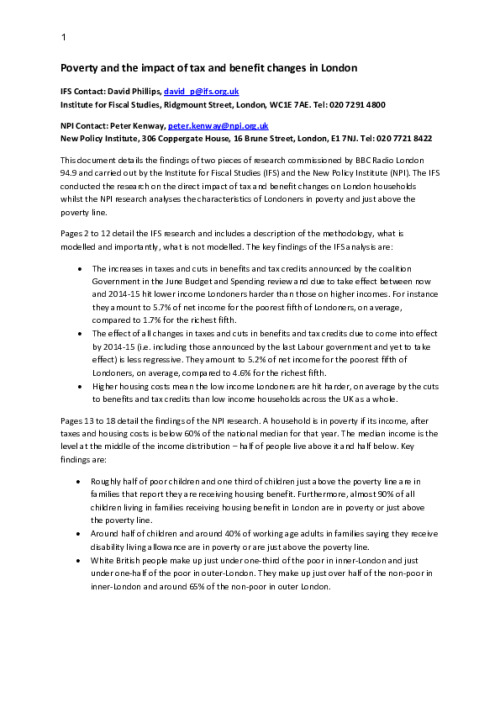<p><p>In a piece of work commissioned by BBC Radio London 94.9, IFS researchers have analysed the impact on households in London of the changes in taxes and benefits due to come into effect by 2014-15 and announced in the Spending Review or earlier, and researchers at the New Policy Institute (NPI) have analysed the characteristics of poor Londoners. <p><p>The key findings of the IFS analysis are: <ul><li>The increases in taxes and cuts in benefits and tax credits announced by the coalition Government in the June Budget and Spending review and due to take effect between now and 2014‐15 hit lower income Londoners harder than those on higher incomes. For instance they amount to 5.7% of net income for the poorest fifth of Londoners, on average, compared to 1.7% for the richest fifth. <p><li>The effect of all changes in taxes and cuts in benefits and tax credits due to come into effect by 2014‐15 (i.e. including those announced by the last Labour government and yet to take effect) is less regressive. They amount to 5.2% of net income for the poorest fifth of Londoners, on average, compared to 4.6% for the richest fifth. <p><li>Higher housing costs mean the low income Londoners are hit harder, on average by the cuts to benefits and tax credits than low income households across the UK as a whole. </ul><p>A household is in poverty if its income, after taxes and housing costs is below 60% of the national median for that year. The median income is the level at the middle of the income distribution - half of people live above it and half below. Key findings of the NPI research are: <ul><li>Roughly half of poor children and one third of children just above the poverty line are in families that report they are receiving housing benefit. Furthermore, almost 90% of all children living in families receiving housing benefit in London are in poverty or just above the poverty line. <p><li>Around half of children and around 40% of working age adults in families saying they receive disability living allowance are in poverty or are just above the poverty line. <p><li>White British people make up just under one‐third of the poor in inner‐London and just under one‐half of the poor in outer‐London. They make up just over half of the non‐poor in inner‐London and around 65% of the non‐poor in outer London.</ul></p>










